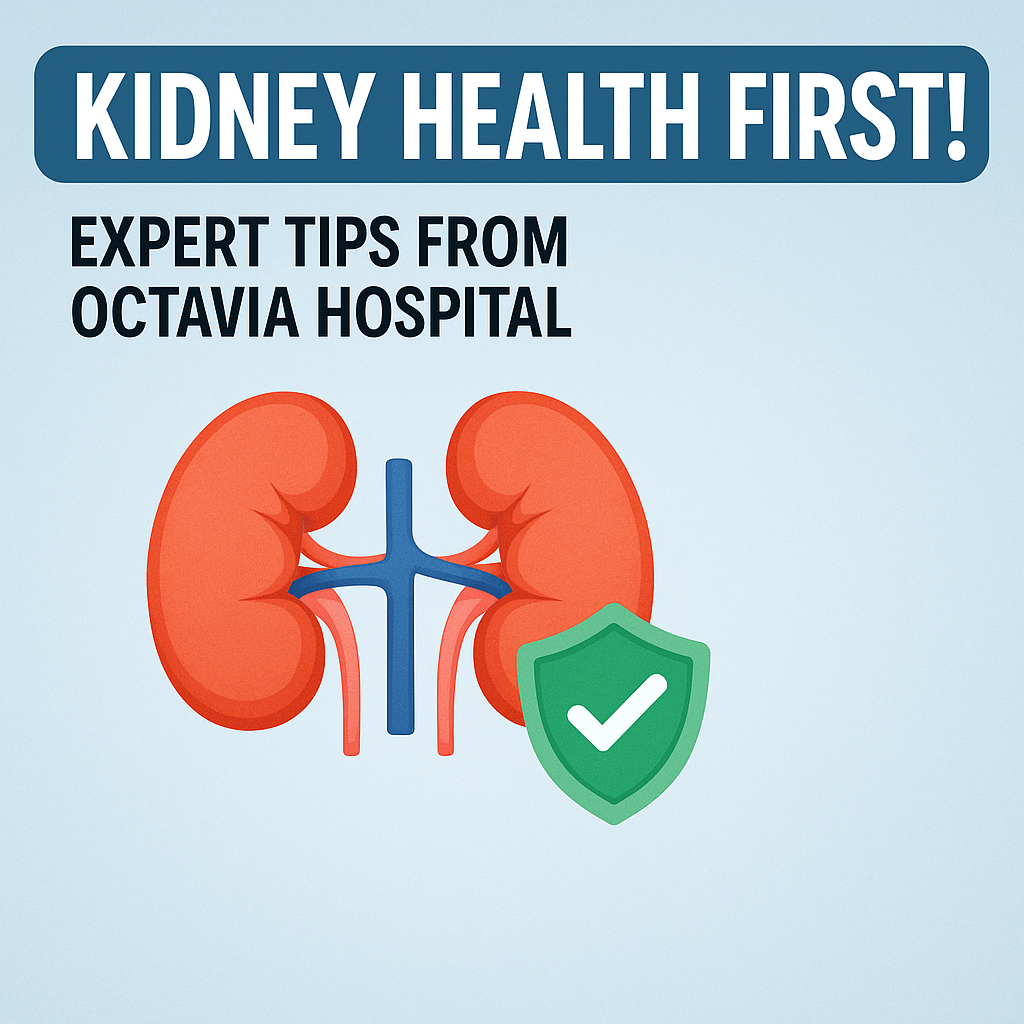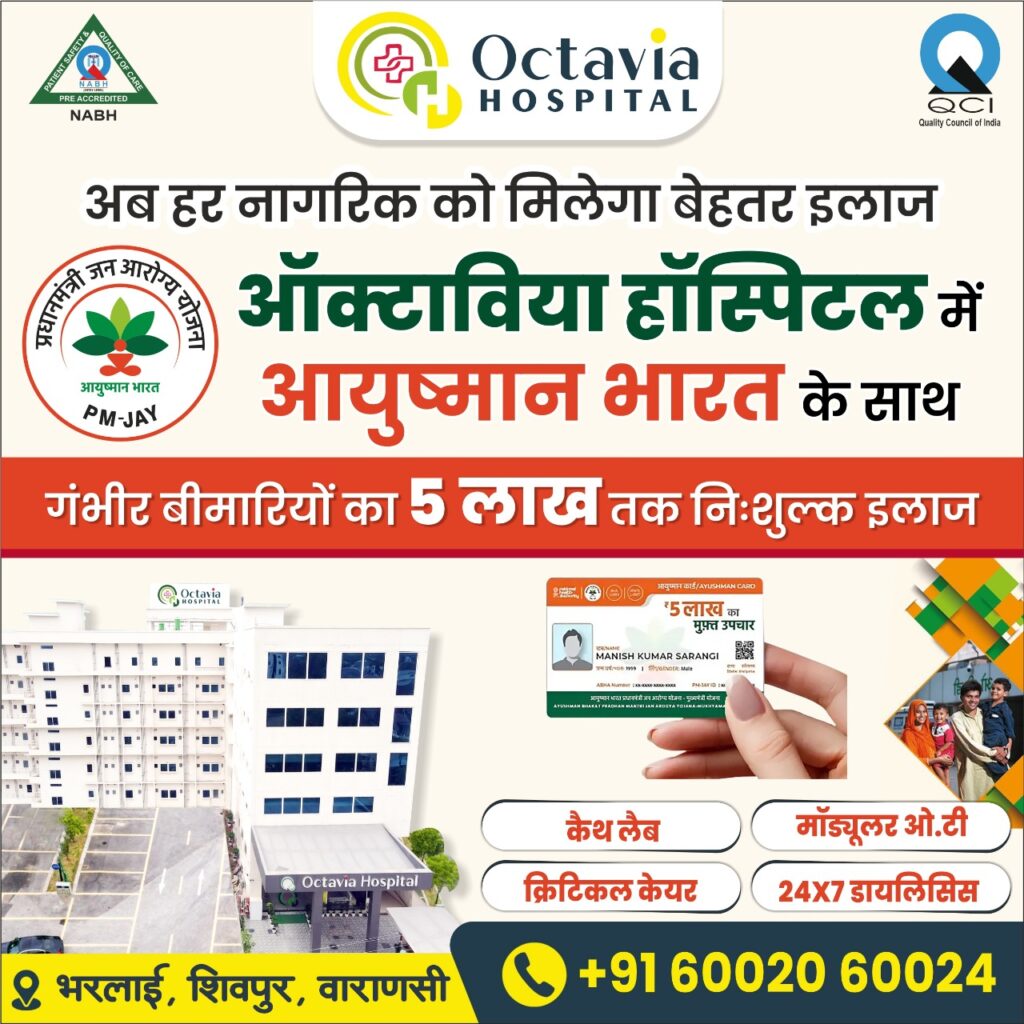At Octavia Hospital, we are committed to providing exceptional care and promoting the well-being of our community. Understanding the importance of kidney health is essential, as these vital organs perform crucial functions that sustain life. …

Prioritizing Kidney Health at Octavia Hospital: A Comprehensive Guide
At Octavia Hospital, we are committed to providing exceptional care and promoting the well-being of our community. Understanding the importance of kidney health is essential, as these vital organs perform crucial functions that sustain life.
Our Department of Renal Sciences (Nephrology) is dedicated to providing comprehensive kidney care through a full range of diagnostic, therapeutic, and preventive services. Our team of experienced nephrologists, led by Dr. Rishab Jaiswal, offers personalized treatment plans tailored to each patient’s needs.
We are committed to delivering compassionate care, utilizing advanced medical technology to ensure the best possible outcomes for our patients.
Our kidneys are responsible for filtering waste products, regulating fluid balance, controlling blood pressure, and producing hormones that influence other bodily functions. Maintaining their health is vital for overall well-being.
Common Causes of Kidney Disease
Chronic Kidney Disease (CKD) can result from various factors, including:
- Diabetes: Elevated blood glucose levels can damage kidney tissues.
- Hypertension (High Blood Pressure): Persistent high blood pressure can harm the blood vessels in the kidneys.
- High Cholesterol: Excess cholesterol can lead to kidney damage.
Identifying and managing these risk factors are crucial steps in preventing kidney-related ailments.
Recognizing Symptoms of Kidney Issues
Early detection of kidney problems can significantly impact treatment outcomes. Be attentive to symptoms such as:
- Fatigue
- Swelling in the ankles, feet, or around the eyes
- Changes in urination frequency or appearance
- Persistent itching
- Shortness of breath
If you experience any of these symptoms, consulting a healthcare professional promptly is advisable.
Preventive Measures for Kidney Health
At Octavia Hospital, we recommend the following lifestyle modifications to support kidney health:
- Drinking sufficient water aids in flushing out toxins and supports kidney function.
- Consuming a diet rich in fruits, vegetables, whole grains, and lean proteins helps manage weight and blood pressure.
- Exercise enhances circulation and aids in controlling blood pressure and blood sugar levels.
- Regularly check blood pressure, blood sugar, and cholesterol levels to detect any abnormalities early.
- Avoid excessive use of non-prescription pain medications, as they can harm kidney function over time.
- Smoking cessation improves overall vascular health, reducing the risk of kidney disease.
The Importance of a Renal Diet
For individuals with existing kidney conditions, adhering to a renal diet is essential. This specialized diet focuses on managing nutrient intake to reduce the kidneys’ workload. Key components include:
- Balancing protein intake helps prevent malnutrition while minimizing kidney strain.
- Regulating sodium, potassium, and phosphorus levels maintains fluid balance and prevents complications.
- Monitoring fluid intake prevents swelling and maintains proper hydration.
Consulting with a registered dietitian can help tailor a renal diet plan to individual needs.
Octavia Hospital’s Commitment to Kidney Health
At Octavia Hospital, we offer comprehensive nephrology services, including:
- Expert Consultations: Our nephrologists provide personalized care plans for kidney disease prevention and management.
- Diagnostic Services: Advanced imaging and laboratory tests for accurate kidney function assessment.
- Dialysis Facilities: State-of-the-art dialysis units for patients requiring renal replacement therapy.
- Patient Education: Workshops and resources to educate patients and the community about kidney health.
Detecting Early Kidney Problems at Octavia Hospital: Your Guide to Prevention and Care
Early detection of kidney issues is crucial for effective management and prevention of progression to more severe stages. At Octavia Hospital, we emphasize proactive health measures and comprehensive screenings to ensure optimal kidney health for our community.
Our Department of Renal Sciences (Nephrology) is dedicated to providing comprehensive kidney care through a full range of diagnostic, therapeutic, and preventive services. Our team of experienced nephrologists, led by Dr. Rishab Jaiswal, offers personalized treatment plans tailored to each patient’s needs.
Understanding Kidney Function and Early Indicators
The kidneys are essential organs responsible for filtering waste, balancing fluids, regulating blood pressure, and producing vital hormones. In the early stages of kidney disease, individuals may not experience noticeable symptoms. However, as the condition advances, signs may include:
- Changes in Urination: Experiencing more frequent urination, especially at night, or less frequent urination with dark-coloured urine.
- Swelling: Retention of fluids leading to swelling in areas such as the hands, legs, ankles, feet, or face.
- Fatigue: Feeling unusually tired or weak due to decreased red blood cell production.
- Shortness of Breath: Difficulty breathing caused by fluid accumulation in the lungs.
- Itchy Skin: A buildup of waste products leading to persistent itching.
Screening and Diagnostic Services at Octavia Hospital
Regular screenings are vital for individuals at risk of kidney disease. At Octavia Hospital, we recommend screenings for:
- Individuals with Hypertension or Cardiovascular Disease
- Diabetic Patients or Those with Significant Obesity
- Adults Over 60 Years of Age
- Individuals of African American Descent
- Those with a Family History of Kidney Disease
Screenings typically include:
- Glomerular Filtration Rate (GFR) Test: Evaluates kidney function by measuring the rate at which the kidneys filter waste.
- Urine Albumin-to-Creatinine Ratio (UACR): Detects the presence of albumin in urine, indicating kidney damage.
- Blood Pressure Monitoring: High blood pressure can damage kidney vessels, so regular monitoring is essential.
Preventive Measures and Lifestyle Modifications
Adopting a healthy lifestyle plays a significant role in preventing kidney disease:
- Maintain a Balanced Diet: Incorporate fruits, vegetables, whole grains, and lean proteins while limiting salt and processed foods.
- Stay Hydrated: Adequate water intake supports kidney function and helps flush out toxins.
- Engage in Regular Exercise: Physical activity aids in controlling weight, blood pressure, and blood sugar levels.
- Monitor Health Metrics: Keep track of blood pressure, blood sugar, and cholesterol levels to detect early signs of kidney stress.
- Limit Use of Pain Relievers: Avoid excessive use of non-prescription pain medications, which can harm kidneys over time.
- Quit Smoking: Smoking can impair kidney function and exacerbate existing health conditions.
The Importance of Regular Check-ups
Even in the absence of symptoms, regular check-ups are essential, especially for those with risk factors. Early detection through screenings can lead to timely interventions, slowing or preventing the progression of kidney disease.






